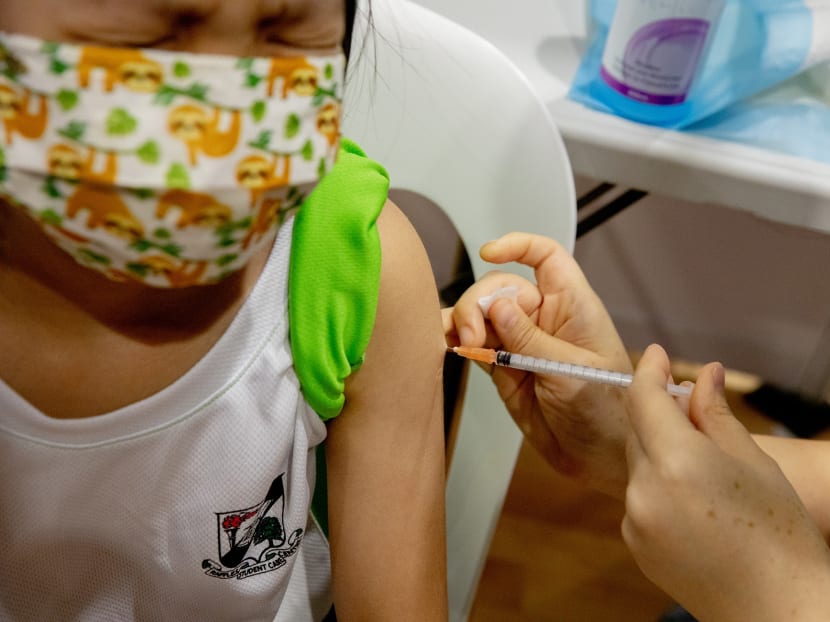No serious side effects reported among vaccinated children in Singapore so far: MOH
SINGAPORE – As of last Friday (Jan 7), the Ministry of Health (MOH) has not received any report of serious adverse events or myocarditis from vaccination in children in Singapore since the roll-out of the national vaccination programme began late last month to children aged five to 11, said Dr Janil Puthucheary, the Senior Minister of State for MOH.

Singapore started vaccinating children aged five to 11 in December 2021.
- The Ministry of Health has not received any report of serious adverse events or myocarditis from Covid-19 vaccination of children so far, Dr Janil Puthucheary said
- Most side effects experienced by children here after vaccination have been mild, he added
- The incidence of myocarditis is higher among children infected with Covid-19 than among children after vaccination
- Education Minister Chan Chun Sing said that no vaccine-related infection controls will be implemented for children
SINGAPORE – As of last Friday (Jan 7), the Ministry of Health (MOH) has not received any report of serious adverse events or myocarditis from vaccination in children aged five to 11, Dr Janil Puthucheary said.
The Senior Minister of State for Health said: “Most side effects experienced by children after vaccination have been mild, such as injection site pain, fatigue and fever, and they typically resolve in a few days.”
He was speaking in Parliament on Monday, in response to questions from several Members of Parliament (MPs) regarding the Covid-19 vaccination programme for children.
Singapore rolled out the immunisation exercise for children aged five to 11 in December last year and as of Jan 7, about 123,000 children in this age group have received at least one dose of the vaccine or booked vaccination appointments, he said.
Dr Puthucheary added that all designated paediatric vaccination centres are sufficiently equipped and their personnel trained to manage any on-site emergencies arising from allergic reactions.
He also noted that international data has shown that the incidence of myocarditis among children and youth aged 12 to 17 who were infected with Covid-19 is about 45 per hundred thousand infections.
In contrast, the incidence of myocarditis among children who have received the Covid-19 vaccine is about one in a million doses.
“So you can see that the risk is much lower with immunisation and hence, the benefits are much greater.”
FINANCIAL AID
Dr Puthucheary added that children who are citizens, permanent residents or long-term pass holders are covered by the Vaccine Injury Financial Assistance Programme for Covid-19.
It was introduced last year to provide financial support to those who are adversely affected by their vaccine shots.
He said that as of Jan 6, 14,097 children, or less than 4 per cent of those aged 12 to 19, remain unvaccinated, of which 14 are not medically eligible for the Pfizer-BioNTech (Comirnaty) Covid-19 vaccine, which is the only vaccine authorised for use on children under 18.
Special exemptions are made for those aged 12 to 17 to receive the Sinovac-CoronaVac vaccine instead under a dedicated health programme, he added.
MOH and the expert committee on Covid-19 vaccination will review if this should be extended to children aged five to 11 who are also medically ineligible to take up the Pfizer-BioNTech (Comirnaty) shot.
CONCERNS OVER MRNA VACCINES
Asking a supplementary question, Leader of the Opposition and Workers’ Party chief Pritam Singh noted that many parents may have taken messenger ribonucleic acid (mRNA) vaccines themselves, but some are concerned about the possible long-term effects of such shots for children.
“To that extent, will MOH allow such parents to wait until non-mRNA traditional protein-based vaccines are approved for their children's inoculation, so as to give them more choice and to assuage concerns?” he asked.
Minister for Health Ong Ye Kung said that the Pfizer-BioNTech (Cominarty) vaccine has undergone extensive clinical trials that proved its safety and efficacy for children.
He added that parents “have to balance this against the downside of getting infection”, emphasising the higher incidence rate of myocarditis among infected children than among those who received the vaccine.
He also noted the incidence of multi-system inflammatory syndrome (MIS-C), which has been linked to children infected with Covid-19.
Addressing questions by MPs about booster doses for children, Dr Puthucheary said that there are no recommendations to administer them for now.
“If introduced, MOH will continue to ensure that families with children are able to access vaccination services in a convenient manner,” he told the House.











